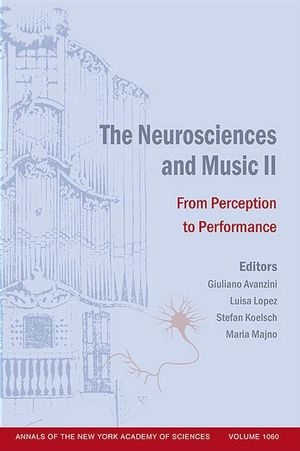The Neurosciences and Music II: From Perception to Performance, Volume 1060ISBN: 978-1-57331-611-8
Paperback
504 pages
April 2006, Wiley-Blackwell
 This is a Print-on-Demand title. It will be printed specifically to fill your order. Please allow an additional 10-15 days delivery time. The book is not returnable.
|
||||||
Preface: Giuliano Avanzini, Luisa Lopez, Stefan Koelsch, and Maria Majno.
Part I: Ethology/Evolution: Do Animals Have Music or Something Else?:.
1. Introduction: Krumhansl and Cross.
2. Probing the Evolutionary Origins of Music Perception: Josh McDermott.
3. Between Perception and Performance: Vocal Learning as Key Constraint on the Path to Music and Language: Bjorn Merker.
4. The Biology and Evolution of Music: a Comparative Perspective: W. Tecumseh Fitch.
Part II: Music and Language:.
5. Introduction: Besson and Friederici.
6. Empirical Comparisons of Music and Language: Prosody and Syntax: Aniruddh D. Patel.
7. Music and Linguistic Processing in Singing: Daniele Schön.
Part III: Mental Representations:.
8. Introduction: Avanzini and Schröger.
9. Implicit Investigations of Tonal Knowledge in Non-Musician Listeners: Barbara Tillmann.
10. Cortical Networks That Track Musical Structure: Petr Janata.
11. Anticipatory Musical Imagery and Its Neural Basis: Josef P. Rauschecker.
12. The Neural Substrates of Semantic and Episodic Memory of Music: Hervé Platel.
13. Representation of Pitch in Auditory Cortex: Lesion Effects and Neural Coding: Mark J. Tramo.
14. Aspects of Multisensory Perception: The Integration of Visual and Auditory Information Processing in Musical Experiences: Donald A. Hodges.
Part IV: Developmental Aspects and Impact of Music on Education:.
15. Introduction: Lopez and Trehub.
16. Music Listening, Music Lessons and Cognitive Abilities: Glenn Schellenberg.
17. The Neural Basis of Rhythm and Melody Processing in Young Children, Pre and Post Music Training: Katie Overy.
18. Brain and Cognitive Effects of Learning a Musical Instrument: Gottfried Schlaug.
19. Influences of Musical Training on Neurophysiological Correlates of Music and Speech Perception in Children: Sebastian Jentschke.
20. Temporal Entrainment of Cognitive Functions in Music: Neural Dynamics and Brain Plasticity: Michael H. Thaut.
21. Quantifying Tone Deafness in the General Population: John A. Sloboda and Karen Wise.
Round Table: Music Therapy: the Long Way to Evidence-Based Methods: Pending Issues and Perspectives:.
22. Introduction: Lopez.
23. Scientific Perspectives of Music Therapy: Thomas Hillecke.
24. Outcome Research in Music Therapy: A Step on the Long Road to an Evidence-Based Treatment: Anne K. Nickel.
25. Music Therapy Research in Ibero-American Countries: An Overview Focus on Assessment and Clinical Evaluation: Patricia L. Sabbatella.
26. The Future of Music in Therapy and Medicine: Michael Thaut.
Part V: Neurological Disorders and Music:.
27. Introduction: Griffiths and Altenmueller.
28. Central Auditory Processing in Tune Deaf Subjects: Dennis Drayna.
29. Neuropsychological Assessment of Musical Difficulties: Lola L. Cuddy.
30. Musical Behavior in a Neurogenetic Developmental Disorder: Evidence from Williams Syndrome: Daniel J. Levitin.
31. Perceptual Asymmetries and Cortical Changes after Sensory Motor Retuning in Musicians Suffering from Focal Hand Dystonia: Victor Candia.
Part VI: Music Performance:.
32. Introduction: Minciacchi and McAdams.
33. Sensory-Motor Integration and Disintegration in Music Performance: Eckart Altenmueller.
34. Memory and Movement Preparation in Music Performance: Caroline Palmer.
35. Neural Control of Rhythmic Sequences: Fredrick Ullén.
36. Tuning the Musical Brain: Lauren Stewart.
37. Structural, Functional and Perceptual Differences in the Auditory Cortex of Musicians and Non-Musicians Predict Musical Instrument Preference: Peter Schneider.
Part VII: Emotion in Music:.
38. Introduction: Peretz and Sloboda.
39. Investigating Emotion with Music: and fMRI Study: Stefan Koelsch.
40. Neuropsychological Studies on Music Memory and Musical Preference: Séverine Samson.
41. The Time Course of Emotional Response to Music: Emmanuel Bigand



